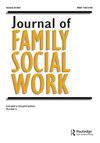Intergenerational resilience in families affected by war, displacement, and migration: “It runs in the family”
IF 0.7
Q3 SOCIAL WORK
引用次数: 25
Abstract
ABSTRACT This article argues for an expansion of the focus on resilience as a characteristic of the individual to one of resilience as a familial and intergenerational experience. Drawing upon a case study of a young person’s tumultuous journey from war to refuge, the authors explore the impact, challenges, and opportunities inherent within the context of war-induced flight, migration, and resettlement, with special attention to individual, family and intergenerational resilience. The authors demonstrate that in the face of adversity and loss, war-affected families do not only run from war, but are also able to repair, grow, and even pass down their adaptive capacities from the “recovery repertoire” to the next generation. Given the capacity for intergenerational resilience, it is the authors’ contention that interventions and practices aimed to support the psychosocial well-being of war-affected children must therefore consider the prominence of not only daily stressors, but also protective factors at each level of youth’s socioecological system to bolster resilience. Additionally, we argue that social work practice and interventions must broaden service options to include attention to caregiver mental health along with the mental health of the war-affected child to capture the complexities of the intergenerational transmission of both trauma and resilience.受战争、流离失所和移民影响的家庭的代际韧性:“它在家庭中运行”
摘要本文主张将对作为个体特征的韧性的关注扩展到作为家庭和代际体验的韧性。根据一个年轻人从战争到避难的动荡旅程的案例研究,作者探讨了战争引发的逃亡、移民和重新安置背景下固有的影响、挑战和机遇,并特别关注个人、家庭和代际韧性。作者证明,面对逆境和损失,受战争影响的家庭不仅能够逃离战争,而且能够修复、成长,甚至将他们的适应能力从“恢复剧目”传递给下一代。鉴于代际复原力的能力,作者认为,旨在支持受战争影响儿童心理健康的干预措施和做法不仅必须考虑日常压力源的重要性,还必须考虑青年社会生态系统各个层面的保护因素,以增强复原力。此外,我们认为,社会工作实践和干预措施必须扩大服务选择,包括关注照顾者的心理健康以及受战争影响儿童的心理健康,以捕捉创伤和复原力代际传递的复杂性。
本文章由计算机程序翻译,如有差异,请以英文原文为准。
求助全文
约1分钟内获得全文
求助全文
来源期刊

Journal of Family Social Work
SOCIAL WORK-
CiteScore
2.10
自引率
0.00%
发文量
4
期刊介绍:
Each issue of the Journal of Family Social Work contains peer reviewed research articles, conceptual and practice articles, creative works, letters to the editor, and book reviews devoted to innovative family theory and practice subjects. In celebrating social workers" tradition of working with couples and families in their life context, the Journal of Family Social Work features articles which advance the capacity of practitioners to integrate research, theory building, and practice wisdom into their services to families. It is a journal of policy, clinical practice, and research directed to the needs of social workers working with couples and families.
 求助内容:
求助内容: 应助结果提醒方式:
应助结果提醒方式:


